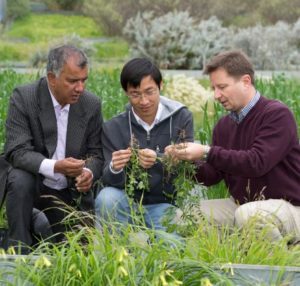
World-first research at Flinders University has identified two strains of microbes that dramatically increase the ability of lucerne to fix atmospheric nitrogen, boosting the feed crop’s early growth and resilience, and ultimately its yield.
The legume seed crop, based in the South East of South Australia, is the basis of a national feed industry worth close to $100 million a year
Research by medical biotechnology PhD student Hoang Xuyen Le drew on the hundreds of strains of endophytic actinobacteria, which grow naturally within legume roots. His research isolated and identified two strains of microbes that in laboratory and glasshouse trials were shown to promote growth in the shoots of the legume plants.
The research was co-supervised by Professor Chris Franco from Flinders and Mr Ross Ballard from SARDI. A patent has been lodged in relation to the two strains.
Nitrogen is absorbed by the plants through the formation of external nodules by symbiotic rhizobium bacteria that grow in the nodules. Professor Franco said that following the inoculation of the lucerne seeds with spores of the actinobacteria, the nodules grew significantly larger, fixing greater amounts of nitrogen.
“Up to 50 or even 70 per cent more nitrogen was fixed,” Professor Franco said.
The effect was to substantially improve the establishment of the lucerne, increase its resilience in drought conditions and also boost its yield.
“We found that our two main strains gave us a crop yield increase of 40 to 50 per cent in the glasshouse, and we would look for at least a 20 per cent improvement in the field,” Professor Franco said.
He said as much as 25 per cent of the higher levels of nitrogen persisted in the soil, improving the growing conditions for subsequent crops.
The Flinders biotechnologists will now expand their trials on lucerne in the field, and will also look for similar effects in other legume crops, including peas, chick peas and faba and soya beans.
Further research is required to understand the underlying mechanism of the bugs: while it is likely that their natural propensity to produce bioactive compounds is partly responsible for increasing the general robustness of the inoculated Lucerne by reducing disease, they may also be encouraging the growth of rhizobium bacteria in the soil.
Professor Franco said that actinobacteria offer an environmentally friendly way of controlling disease, especially fungal root diseases such as Rhizoctonia, reducing the need for fossil-derived pesticides and fertiliser.
The potential to capture atmospheric nitrogen offers a major environmental benefit.
“This is very good news all round,” Professor Franco said.

